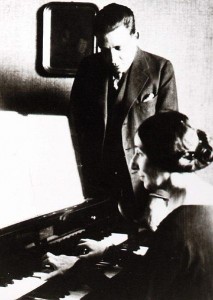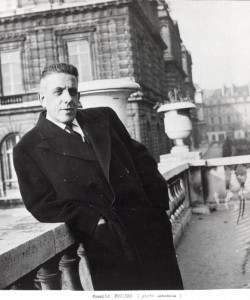The “Half Monk and Half Delinquent” Francis Poulenc
Clair Hill, the main character of Twinmaker, loves music. I do too, so it’s perhaps unsurprising that she shares some of my tastes. One of my favourite composers is Francis Jean Marcel Poulenc, a member of the French group Les Six (not a band name, but it would be a good one, wouldn’t it?). He lived between 1899 and 1963 and is considered by some to be one of the first composers to be openly gay.
 How to describe his music? It’s playful, serene, mercurial, inspired–somehow all these things at once. The title of this post comes from a description of him rather than his music, written in 1950; it’s full of contradictions that I think apply to music equally well: “tender and impertinent, melancholy and serenely mystical”. The surest way to take the measure of something is to grip it with both hands, or in this case both ears, so here are some of my favorite pieces that you can listen to if you’re so inclined.
How to describe his music? It’s playful, serene, mercurial, inspired–somehow all these things at once. The title of this post comes from a description of him rather than his music, written in 1950; it’s full of contradictions that I think apply to music equally well: “tender and impertinent, melancholy and serenely mystical”. The surest way to take the measure of something is to grip it with both hands, or in this case both ears, so here are some of my favorite pieces that you can listen to if you’re so inclined.
The first work I ever heard was his Concerto for two pianos and orchestra. Its first movement reminds me of the soundtrack to a melodramatic silent movie: I can see the moustache-twirling villain tying the hapless heroine to the train tracks, the burly hero hurrying to save her. This performance of the opening movement features the composer himself. Check out the amazing hair in the orchestra! The second movement is much more reflective, but still unpredictable. You never quite know what he’s going to do next.
When Clair is searching for information on Improvement and listening to her favorite performances by Tilly Kozlova, this piece, “Melancholie”, would be one of them. Also on the playlist would be the work of another member of Les Six, Éric Satie. Here’s a recording of Poulenc playing what is possible Satie’s most famous work, the Gymnopédies, in 1950.
 Lastly here’s Poulenc as neither performer nor composer, but as arranger of Satie’s delicate “Gnossienne N.3”, on of my favorite pieces of music ever.
Lastly here’s Poulenc as neither performer nor composer, but as arranger of Satie’s delicate “Gnossienne N.3”, on of my favorite pieces of music ever.
Aside: One of Poulenc’s early works, Le bestiaire, ou Le cortège d’Orphée (1917), is based on the poems of Guillame Apollinaire, who coined the word “Surrealism” but also happened to write a very early work of d-mat-related fiction, “Remote Projection”, which was first published in French in 1910 and translated for The Magazine of Fantasy and Science Fiction in 1968. It’s a small world, even without d-mat.
